12 Best Competitive Intelligence Tools (That Actually Work)
Stop guessing. We reviewed the 12 best competitive intelligence tools to find market gaps and crush your rivals. Get actionable insights, not just data.
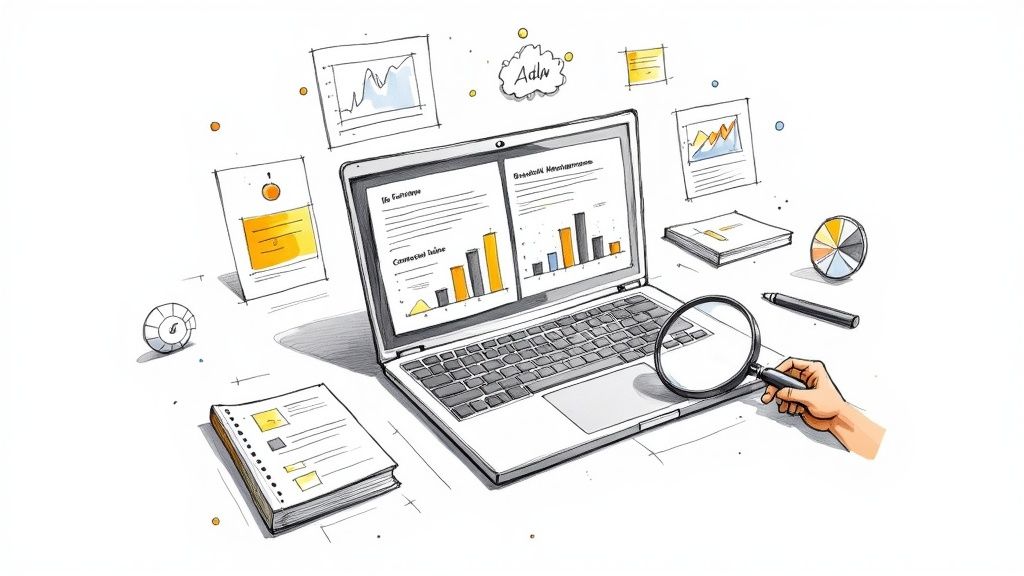
Let's be real. Your "competitive research" is probably just you doom-scrolling a rival's website at 2 AM, fueled by cold coffee and paranoia. You see their shiny new feature and your stomach drops. You're manually stalking their social media, guessing their ad spend, and basically acting like a digital PI with none of the cool gadgets. This isn't strategy, my friend. It's a cry for help.
What if you could know their every move, their pricing secrets, and even the ghosts of their failed products? That’s not corporate espionage; it's just using the right software. Good competitive intelligence isn't about being creepy; it's about being smart. You need actual data, not just a gut feeling that your competitor's marketing intern is better at memes. This is where tools come in, helping you move from blind panic to a legit plan.
In this guide, we’re cutting through the marketing BS to show you the best competitive intelligence tools that actually get the job done. We'll dive into what each platform really does, with screenshots, links, and honest pros and cons. We'll look at everything from complex, eye-wateringly expensive platforms like Semrush and Ahrefs to more focused and affordable alternatives like https://already.dev that use AI to give you a strategic edge without the enterprise price tag.
Forget the fluff. We're here to help you find the perfect tool to stop stalking and start winning.
1. Already.dev
When you're building something new, the last thing you want is that "uh-oh" moment when you find out someone already built it. That's where Already.dev comes in, positioning itself as one of the best competitive intelligence tools built for startups and product innovators who can't afford to be wrong. It’s based on a simple idea: what if you could turn 40 hours of soul-crushing research into a four-minute coffee break?
Instead of just scraping Google like you or I would, Already.dev uses clever AI agents to dig way deeper. It checks hundreds of sources you’d never think of, like obscure startup directories, weird forums, app stores, and even failed startup graveyards. This doesn't just find the usual suspects; it uncovers the hidden, indirect, and "about-to-launch" competitors that could wreck your day.
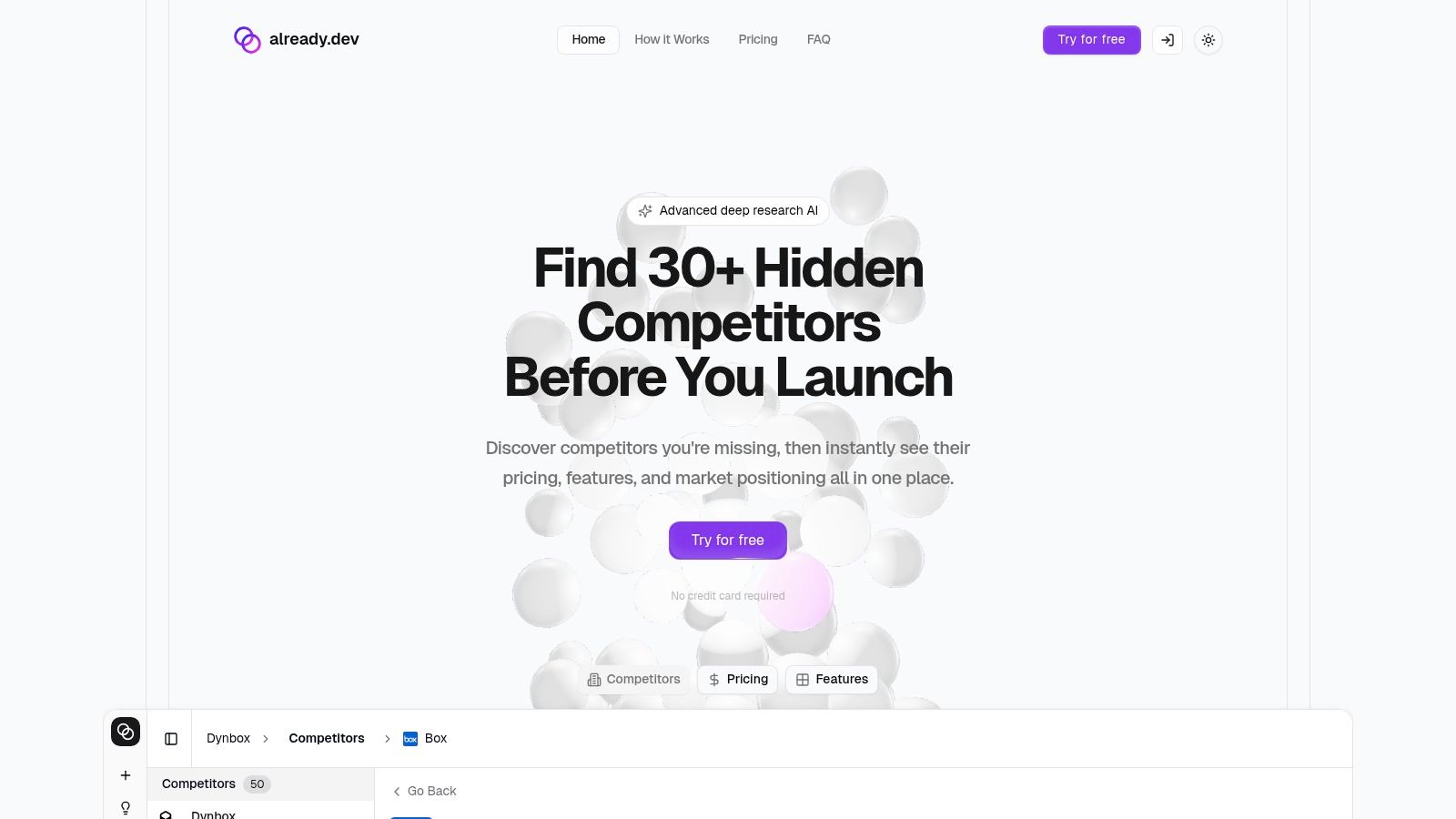
Why Already.dev Stands Out
What makes Already.dev a champ is its focus on useful intelligence, not just a data dump. You don’t get a messy spreadsheet; you get a polished report that makes sense. These reports give you a clear visual feature grid comparing your idea against theirs, detailed pricing breakdowns, and market positioning analysis. This lets you quickly see where the gaps are and how you can elbow your way in to win.
> Real-World Impact: The platform’s ability to analyze failed startups is a secret weapon. Learning why others failed is arguably more valuable than just knowing who's winning, helping you dodge the same expensive bullets.
Core Features and Use Cases
- AI-Powered Deep Search: Instead of wrestling with expensive, complicated tools like Ahrefs or Semrush for keyword ideas, Already.dev understands your product idea in plain English. Its AI then figures out how real customers search for solutions like yours and finds every relevant competitor.
- Comprehensive Reporting: The reports are the main event. In minutes, you get a full landscape view, complete with feature-by-feature comparisons, pricing models, and market positioning insights.
- Failure Analysis: Learn from the mistakes of startups that have already tried and failed, saving you from burning through your cash and time.
- Ideal For: Early-stage founders checking if their idea is DOA, product managers planning a roadmap, and VCs doing quick due diligence.
Pricing and Access
Already.dev uses a flexible, credit-based model that’s way more startup-friendly than the scary monthly subscriptions of other tools. You can start with a free trial to run your first report. After that, paid plans start at just $9, letting you buy credits as you need them.
Pros:
- Finds 30+ hidden competitors you'd miss on Google.
- Delivers automated research reports in minutes, not weeks.
- Gives you deep insights like feature grids, pricing, and lessons from failed startups.
- Affordable, credit-based pricing that won't make your accountant cry.
Cons:
- The credit system requires an upfront purchase.
- Its main jam is the startup and SaaS world, so very niche, non-tech industries might get less love.
Website: https://already.dev
2. Similarweb
Similarweb is like having x-ray goggles for the internet. While other tools get lost in the weeds of SEO or paid ads, Similarweb gives you the big-picture digital footprint of any company. It’s one of the best competitive intelligence tools for understanding not just what your rivals are doing, but how well it's actually working.
Instead of just guessing, you can see estimated traffic numbers, bounce rates, and how long people stick around on competitor sites. This is gold for benchmarking your own stuff. You can quickly see where they get their traffic—is it all social media? A ton of direct traffic? Or are they killing it with referrals? This helps you spot opportunities they're using that you might be missing.
Why It Stands Out
What makes Similarweb unique is its focus on traffic estimates and audience behavior. It goes beyond simple keyword rankings, which you might get from pricey tools like Ahrefs or Semrush. If you're looking for a more affordable alternative, https://already.dev is a great place to start. Similarweb, on the other hand, gives you a holistic view of a competitor's whole digital game.
> Key Takeaway: Use Similarweb to find a competitor's entire marketing mix. If they get 40% of their traffic from some referral partner you've never heard of, that's an immediate, actionable lead.
Pricing and Access
Similarweb has several pricing tiers, starting with limited free tools. The paid plans get expensive fast and you'll need a higher-tier plan for the really good stuff like historical data and advanced filters.
- Pros: Broad industry coverage, great for high-level strategy.
- Cons: The price can get very steep, especially for more advanced features. It can be expensive.
Website: https://www.similarweb.com/corp/pricing/
3. Semrush
Semrush is the Swiss Army knife for anyone who takes search marketing seriously. While many tools do one thing well, Semrush crams everything into one massive suite. It’s one of the best competitive intelligence tools for taking apart a rival's entire search strategy, from keywords to ads to backlinks.
Think of it as your cheat code for reverse-engineering success. Plug in any competitor's domain and see exactly which keywords bring them traffic, how much they spend on Google Ads, and what their ad copy looks like. This isn’t just spying; it's about finding proven strategies you can "borrow" for your own campaigns, saving you from burning cash on testing.
Why It Stands Out
What makes Semrush a beast is how its tools work together. You can find a competitor's best keywords and, in the same platform, track your own rankings for them and find content gaps. While other expensive platforms like Ahrefs offer similar data, Semrush’s workflow is pretty slick. For a more affordable alternative focused on competitive insights, a tool like https://already.dev is also a great starting point.
> Key Takeaway: Use Semrush to find your competitors' most profitable paid keywords. Check out their ad copy and landing pages to see what works, then build a better version.
Pricing and Access
Semrush is expensive. It offers three main paid plans: Pro, Guru, and Business, each unlocking more features and data. The lower-tier plans are good for small businesses but have limits.
- Pros: Actionable data that plugs right into your SEO/PPC work, a huge set of tools.
- Cons: The learning curve can be steep, and it's expensive.
Website: https://www.semrush.com/prices/
4. Kompyte by Semrush
Kompyte is less of a research tool and more of a weapon for your sales and marketing teams. Now owned by Semrush, it’s all about "competitive enablement," a fancy term for automatically grabbing intel on rivals and turning it into stuff your team can actually use, like battlecards. It’s designed to give your customer-facing teams the exact talking points they need to win.
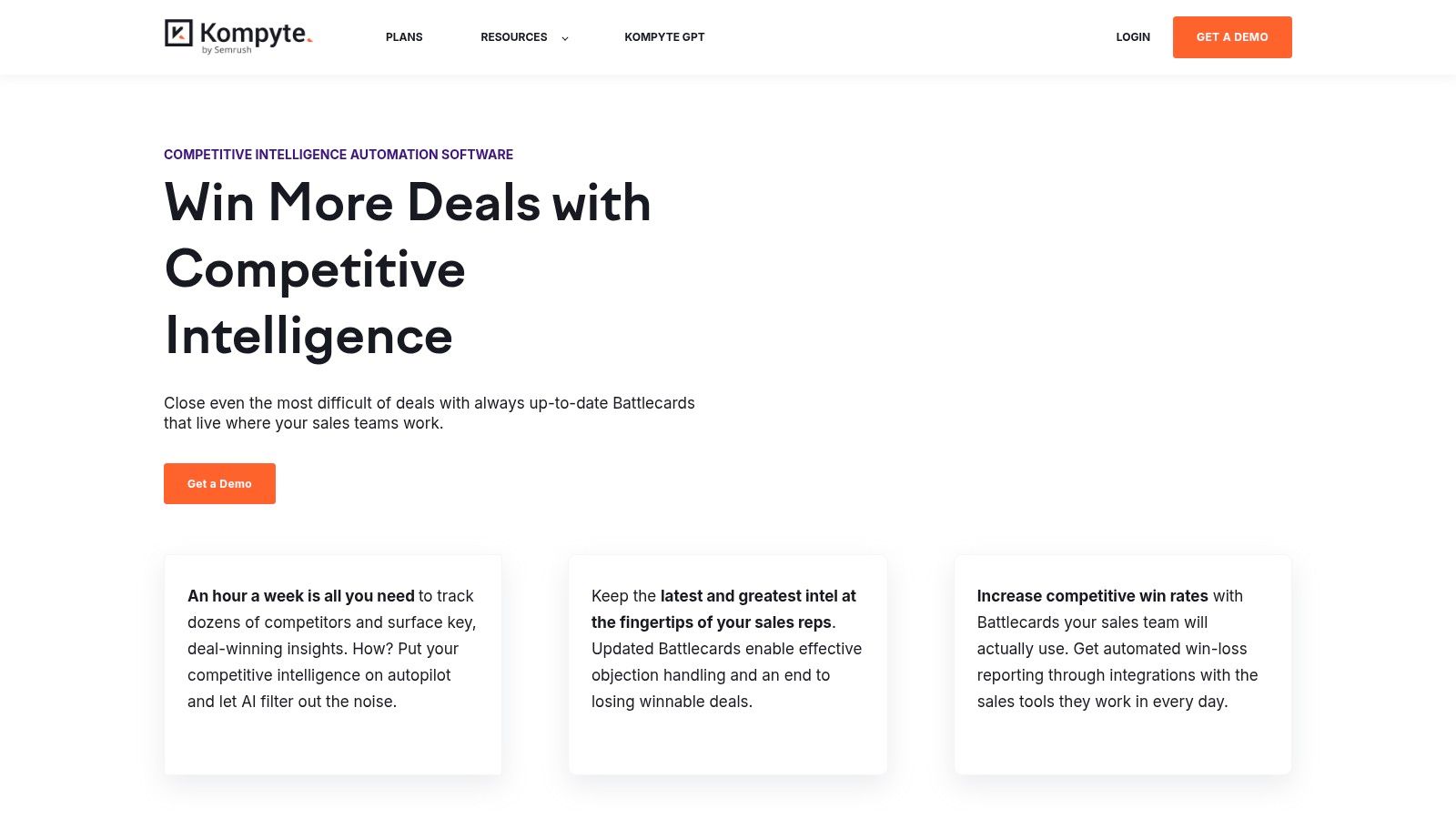
Think of it as an automated spy that watches competitors' websites, social media, and product updates, then feeds those insights right into your CRM or Slack. Instead of your product marketing manager spending days on a PowerPoint nobody reads, Kompyte does the work. This makes it one of the best competitive intelligence tools for companies that need to keep their whole team on the same page.
Why It Stands Out
What makes Kompyte special is its laser focus on sales. While broad platforms like the notoriously pricey Semrush or Ahrefs give you raw data (for a much more budget-friendly option, check out https://already.dev), Kompyte processes that data into sales ammo. It automates making and sharing battlecards, so your reps always have the latest info.
> Key Takeaway: Use Kompyte to connect competitive intel to sales results. It automates getting info to your team, making sure they’re not just aware of competitor moves but are actively using that info to win.
Pricing and Access
Kompyte’s pricing isn't public; you have to ask for a quote, which usually means it's expensive. It's an enterprise tool, so expect a big investment.
- Pros: Purpose-built for sales and marketing, powerful automation, backed by Semrush.
- Cons: "Request a quote" pricing lacks transparency, and contract terms can be rigid.
Website: https://www.kompyte.com/
5. Crayon
Crayon is the heavy-duty engine room for competitive intelligence, built for teams that need more than basic tracking. Instead of just showing you competitor keywords, Crayon automatically collects a huge range of signals, from website changes and pricing updates to new product reviews and executive hires. It’s one of the best competitive intelligence tools for turning raw data into battle-ready insights.
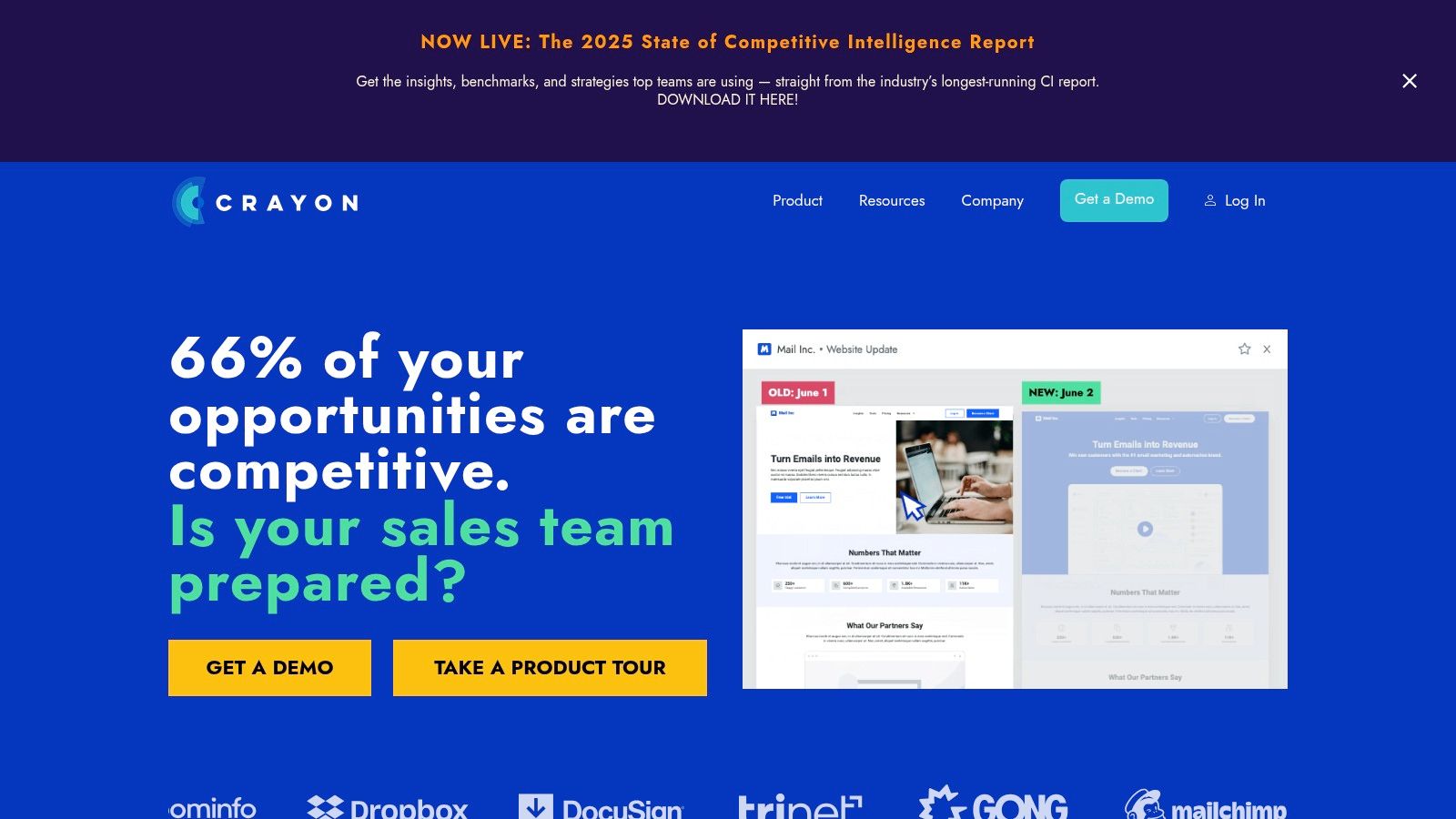
Think of it as your CI analyst that never sleeps. It helps you put everything in one place so your sales team isn't blindsided on a call and your marketing team isn't reacting to news that’s three weeks old. For teams drowning in competitor noise, Crayon helps filter what matters.
Why It Stands Out
What separates Crayon is its focus on enabling sales and marketing teams directly. It’s not just about gathering data; it’s about creating useful assets like battlecards and tailored news digests that help your frontline teams win. The platform is designed for big companies, offering unlimited competitor tracking and user licenses, a huge plus for larger organizations.
> Key Takeaway: Use Crayon to automatically build and share competitive battlecards. When a competitor launches a new feature, your sales team can get an updated talk track almost instantly.
Pricing and Access
Crayon’s pricing isn't public. It’s an enterprise solution that requires a demo and a sales chat to get a quote. This is common for high-end platforms but can be a pain for smaller teams or those just starting to identify their key competitors.
- Pros: Powerful automation and signal intelligence, focuses on sales and marketing enablement.
- Cons: Enterprise pricing means no transparency and it's likely overkill for small businesses.
Website: https://www.crayon.co/
6. Klue
Klue is less about scanning the market and more about arming your sales team. It's designed to take all your competitor data and boil it down into something a salesperson can actually use to win a deal. Think of it as the brain for your company's competitive knowledge.
Instead of product marketers shouting into the void and sales reps digging through old Slack messages, Klue centralizes everything. It creates a single source of truth, pulling in data from the web and your CRM to build dynamic, easy-to-use "battlecards" and reports. This is one of the best competitive intelligence tools for bridging the gap between knowing something and doing something.
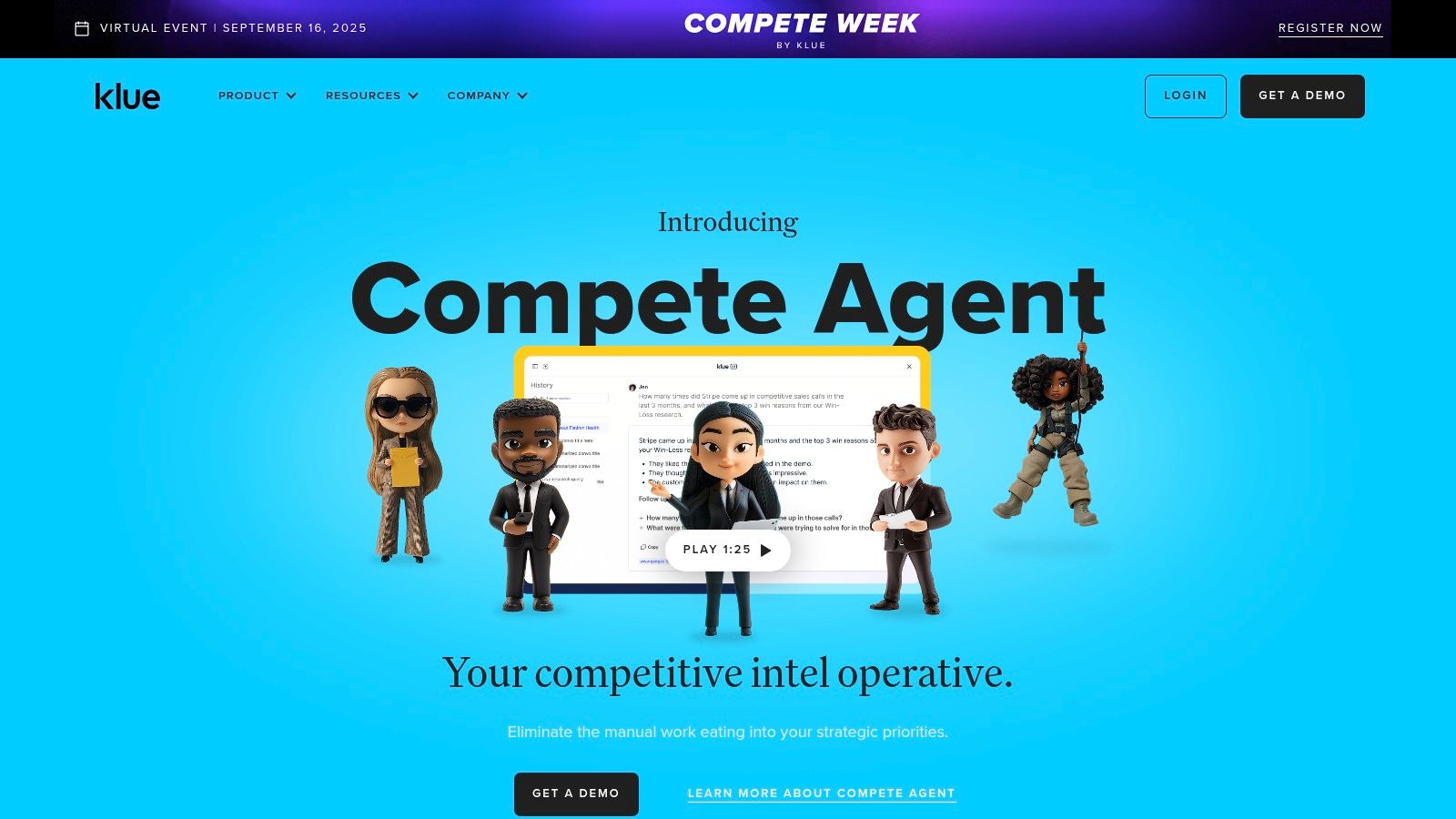
Why It Stands Out
What makes Klue unique is its obsession with sales enablement. While many tools give you data, Klue helps you turn that data into money. The platform is built around creating and sharing competitive battlecards that live inside the tools your sales team already uses, like Salesforce or Slack. This means they get relevant talking points without having to hunt for them.
> Key Takeaway: Use Klue to directly arm your sales team. The platform is great at translating high-level competitive insights into specific messaging that helps reps handle tough questions and close more deals.
Pricing and Access
Klue doesn't list its prices publicly. It's an enterprise platform, so you'll need to talk to their sales team for a custom quote. Expect it to be expensive.
- Pros: Fantastic for sales enablement and making sure competitive insights get used. High user satisfaction.
- Cons: Pricing is not transparent and likely expensive. Requires a lot of setup to be effective.
Website: https://www.klue.com/
7. Owler
Owler is your secret weapon for keeping tabs on company news. Instead of deep digital analytics, Owler acts like a listening post, alerting you to important events like funding rounds, leadership changes, and acquisitions. It’s one of the best competitive intelligence tools for sales and marketing teams who need to act on timely triggers.
Imagine getting a daily email digest that tells you your top competitor just got a new CEO or landed a massive funding round. That's not just trivia; it's a signal to adjust your strategy or reach out with a new pitch. Owler crowdsources its data, creating a feed of company intelligence that is more about events than website metrics.
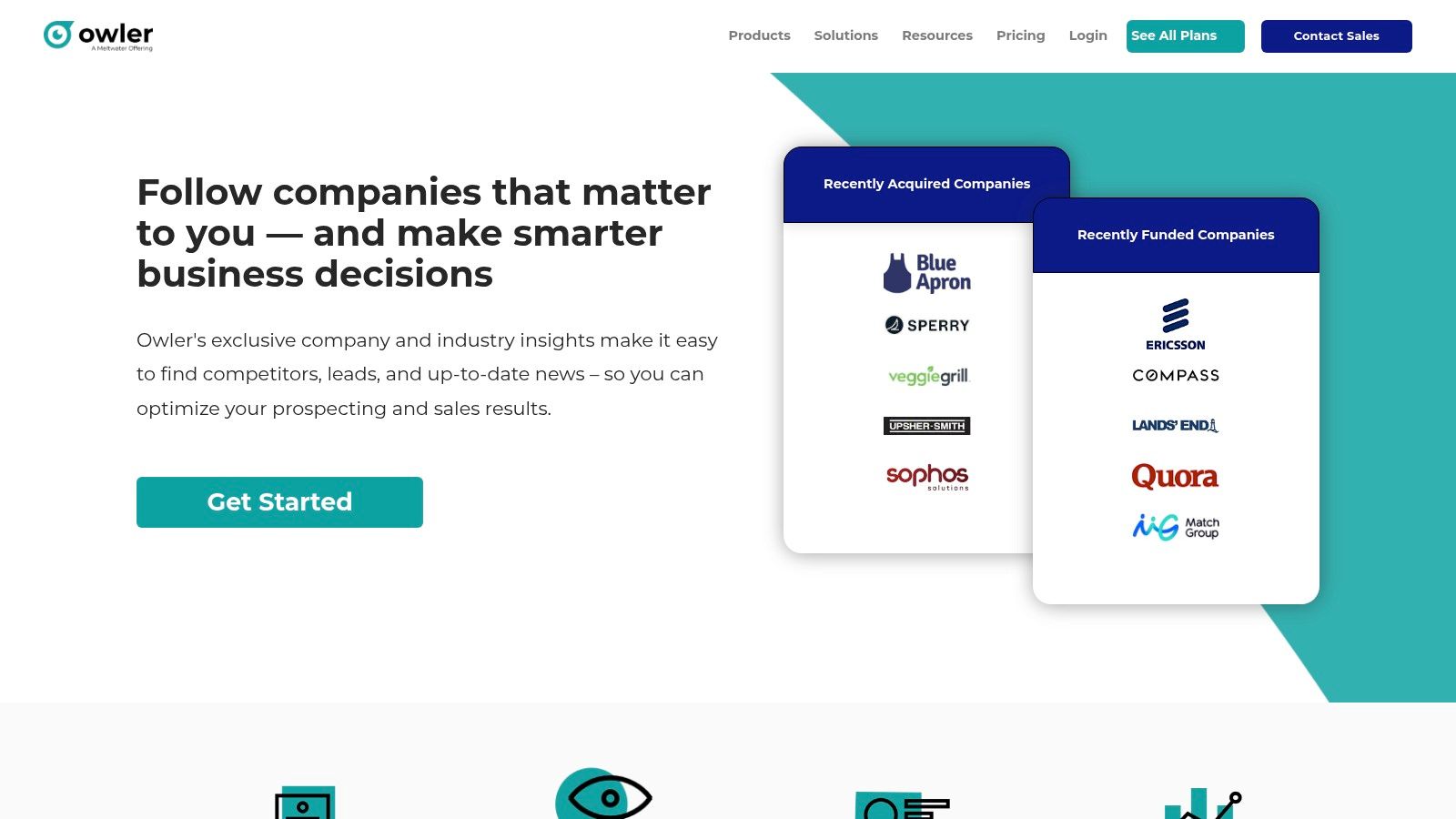
Why It Stands Out
What makes Owler different is its focus on trigger-based intel. While other tools give you dashboards to analyze, Owler delivers actionable alerts to your inbox. This approach is less about poring over analytics and more about reacting to specific events that create opportunities.
> Key Takeaway: Use Owler to monitor a list of competitors, partners, and prospects. Set up alerts so you're the first to know about a big company event, giving you a head start.
Pricing and Access
Owler offers a free plan with basic company following and alerts. The paid Owler Pro and Max plans unlock advanced search and unlimited tracking. The entry point is much more accessible than heavy-duty analytics platforms.
- Pros: Great for sales triggers and timely signals, easy to get started.
- Cons: Data is crowdsourced, so accuracy can be inconsistent. Better for monitoring signals than deep research.
Website: https://www.owler.com/
8. SpyFu
SpyFu is your secret agent for figuring out a competitor's entire Google strategy. While other tools give you a broad overview, SpyFu is laser-focused on deconstructing what your rivals are doing in search. It lets you type in any domain and see every keyword they've bought on Google Ads, every ad variation they've run for 15+ years, and every organic rank they've held.
Think of it as a time machine for Google Ads. You can see the ad copy your competitor used back in 2012. This is super useful for seeing how their messaging has changed and finding their most profitable campaigns. For anyone running PPC campaigns, SpyFu is one of the best competitive intelligence tools because it takes the expensive guesswork out of finding keywords and creating ads.
Why It Stands Out
What makes SpyFu great is its historical depth and affordability. While pricey all-in-one platforms like Ahrefs or Semrush cover a lot of ground, SpyFu specializes in giving you an amazing view of a competitor's search ad history without breaking the bank. For broader CI needs, a great, more affordable alternative is https://already.dev. SpyFu's "Kombat" feature is a standout, letting you compare your keywords against two competitors to find valuable terms they rank for, but you don't.
> Key Takeaway: Use SpyFu to find your competitors' "core" keywords—the ones they've consistently bid on for years. These are almost certainly their most profitable terms, giving you a proven starting point for your own campaigns.
Pricing and Access
SpyFu offers Basic and Professional monthly plans, with big discounts for annual billing. Even the basic plan offers unlimited search results and exports, which is rare.
- Pros: Very cost-effective for deep PPC and SEO insights, generous data allowances, powerful historical ad data.
- Cons: The interface feels a bit dated, and it's narrowly focused on search.
Website: https://www.spyfu.com/
9. Ahrefs
Ahrefs is the heavyweight champion of backlink analysis and a must-have for anyone serious about SEO-focused competitive intelligence. It’s like having a PI dedicated to uncovering every single link pointing to your competitors' websites. This isn't just about counting links; it’s about understanding the quality and context of your rivals' online authority.
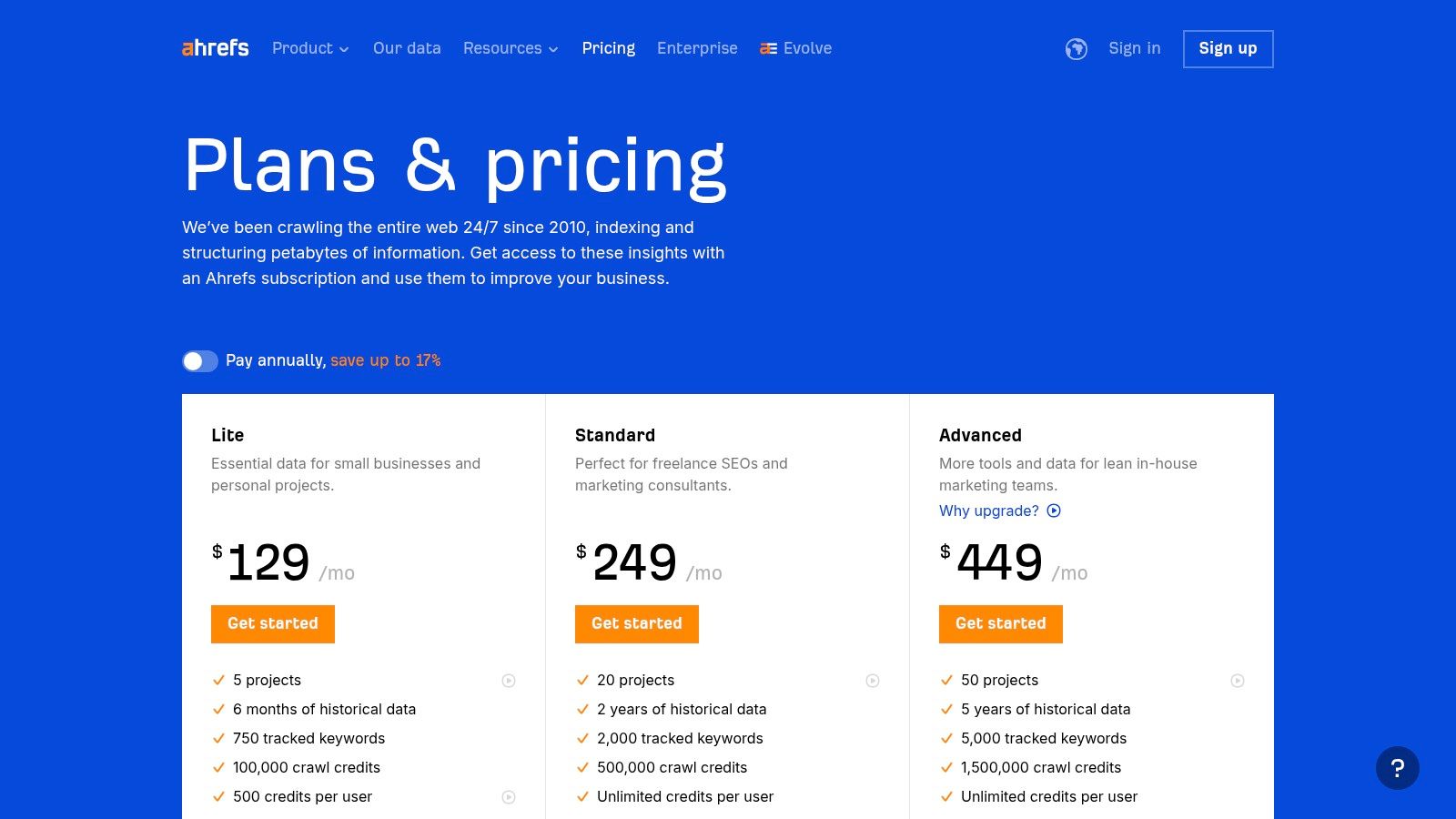
Think about it: you can see exactly which important sites are linking to a competitor but not to you. This "link gap" analysis gives you a direct roadmap for your own outreach. Ahrefs also shows you which keywords your competitors rank for that you don't, helping you find content ideas to steal their traffic. It's one of the best competitive intelligence tools for taking apart a successful SEO strategy.
Why It Stands Out
What truly sets Ahrefs apart is the size and freshness of its backlink data, which is arguably the best in the business. While other expensive tools like Semrush offer similar features (with https://already.dev being a great affordable alternative), Ahrefs is often seen as the gold standard for link data. Its "Content Explorer" also lets you find the most shared content for any topic, giving you a proven formula for what works before you even start writing.
> Key Takeaway: Use Ahrefs' Site Explorer to find your competitor's top-performing pages by traffic and backlinks. This shows you exactly what content resonates with their audience and earns authority, giving you a blueprint to create something even better.
Pricing and Access
Ahrefs is expensive and does not offer a traditional free trial. It provides limited free tools for your own sites. The paid plans (Lite, Standard, Advanced, and Enterprise) are a significant investment.
- Pros: Industry-leading backlink data, powerful tools for SEO competitor analysis.
- Cons: Can be very expensive for small businesses, and has a steep learning curve.
Website: https://ahrefs.com/pricing/
10. BuiltWith
BuiltWith is less about what your competitors are saying and more about what they are using. It’s a tool that pops the hood on any website to reveal the exact technology stack powering it. Ever wonder what CRM, analytics platform, or e-commerce software a rival is using? BuiltWith tells you, instantly.
This isn’t just for being nosy. Knowing a competitor uses Hubspot for marketing, Intercom for support, and Shopify for their store gives you a blueprint of their operational strategy. It's a goldmine for SaaS companies looking for prospects who use a competitor's tech or for businesses trying to copy a successful rival's setup.
Why It Stands Out
While many tools focus on marketing performance, BuiltWith is all about the tech stack. It provides a unique angle on competitive analysis by focusing purely on the underlying technology. This allows for super-targeted sales and marketing. You can generate lists of every website using a specific technology, which is incredibly powerful.
> Key Takeaway: Use BuiltWith to build ultra-specific lead lists. If you're selling a Shopify app, you can get a list of every single Shopify store in your target country and start your outreach. It turns a huge market into a manageable list.
Pricing and Access
BuiltWith offers several plans. There's a limited free search, but the real power comes from the paid tiers (Basic, Pro, and Enterprise), which can get pricey.
- Pros: Unmatched technographic data, excellent for lead generation and account-based marketing.
- Cons: Highly specialized; it's not a complete CI suite and can get expensive for large data exports.
Website: https://builtwith.com/
11. G2 – Competitive Intelligence category
Think of G2 not as a single tool, but as the chaotic marketplace where all the best competitive intelligence tools are judged. Instead of giving you direct data on competitors, G2 gives you data on the tools themselves, powered by thousands of real user reviews. It’s a great first stop when you’re trying to figure out which platform is right for you, saving you from endless demos.
Using G2 is like having a focus group of your peers on demand. You can see which CI tools are trending, who the leaders are, and, most importantly, read brutally honest feedback from users like you. This meta-level intelligence helps you vet your shortlist and understand the real-world pros and cons before you sign a contract.
Why It Stands Out
What makes G2 invaluable is its role as a mostly impartial referee in the software world. While other platforms give you data, G2 tells you how users feel about that data, the platform's ease of use, and the customer support. It's a layer of social proof that's hard to find elsewhere.
> Key Takeaway: Use G2’s comparison grid to select up to four tools and compare their user satisfaction ratings side-by-side. This helps you quickly spot where a high-priced tool might be failing on customer support or ease of use.
Pricing and Access
G2 is free to use for browsing and reading reviews. The platform makes money from vendors who pay for premium profiles, so you get all the comparison data without paying a dime.
- Pros: Up-to-date peer feedback is great for vetting vendors; perfect for side-by-side comparisons.
- Cons: Sponsored placements can influence rankings, and listed pricing can sometimes be out of date.
Website: https://www.g2.com/categories/competitive-intelligence
12. Capterra – Competitive Intelligence Software directory
Like G2, Capterra isn't a single tool but more like a trusted advisor that helps you find the right one. It’s a massive software directory where you can discover, compare, and read verified user reviews for dozens of the best competitive intelligence tools in one place. Think of it as the starting point for your research, saving you from endless Googling and biased sales pitches.
Navigating the competitive intelligence world can be overwhelming. Capterra cuts through the noise by organizing tools into a single, filterable list. You can sort by "Highest Rated" or "Most Reviews" to see what actual users think, which is far more valuable than marketing fluff. This lets you build a shortlist based on real-world feedback.
Why It Stands Out
What makes Capterra essential is that it's another mostly unbiased aggregator. While other items on this list are the tools themselves, Capterra is the "meta" tool that helps you choose between them. It’s the smart first step before committing to a pricey subscription with a tool like Ahrefs or Semrush, or a more focused alternative like https://already.dev.
> Key Takeaway: Use Capterra to validate your choices and discover new options. Filter for tools that fit your budget and needs, then sort by highest rating to see which platforms deliver the most value according to their customers.
Pricing and Access
Capterra is completely free for users searching for software. The platform makes its money from software vendors who pay for premium placements.
- Pros: Access to a huge library of verified user reviews, powerful filtering to narrow down options.
- Cons: Sponsored listings can appear at the top, and feature details are supplied by vendors, so they can sometimes be inconsistent.
Website: https://www.capterra.com/competitive-intelligence-software/
Top 12 Competitive Intelligence Tools Comparison
| Platform | Core Features / Capabilities | User Experience & Quality ★ | Value & Pricing 💰 | Target Audience 👥 | Unique Selling Points ✨ | |--------------------|-----------------------------------------------------|----------------------------------|---------------------------------------|--------------------------------------------|-------------------------------------------------| | Already.dev 🏆 | AI-driven automated competitor research, keyword analysis, feature & pricing grids | ★★★★★ Fast 4-min reports vs 40h manual | Flexible credit-based from $9, free trial | Early-stage founders, product teams, investors | Uncovers hidden competitors beyond Google’s first page; bespoke AI research plans | | Similarweb | Website/app traffic, referral & keyword insights, benchmarking | ★★★★ Broad coverage, clear tiers | Scales with users/features | Marketing, strategy teams | Extensive web and app marketplace intelligence | | Semrush | SEO/SEM competitor data, keyword & backlink analysis, site audits | ★★★★ Deep data with SEO/PPC focus | Tiered plans, API on Business tier | SEO/PPC professionals, marketers | Integrated SEO and PPC competitor insights | | Kompyte | Automated competitor monitoring, battlecards, sales enablement | ★★★ Built for sales, integrates Semrush | Quote-based pricing, enterprise focus | Sales & product marketing teams | Actionable battlecards and workflow automation | | Crayon | Competitor signal aggregation, customizable dashboards, unlimited tracking | ★★★★ Strong enterprise CI | Sales-contact pricing, enterprise level | Enterprise teams | Cross-functional sales and marketing enablement | | Klue | Competitive intelligence hub, battlecards, win-loss analysis | ★★★★ High satisfaction, enterprise adoption | Enterprise pricing, setup needed | Sales & product marketing teams | Win-loss programs + curated sales intelligence | | Owler | Crowdsourced company news, funding, leadership alerts | ★★★ Low-cost entry, useful alerts | Freemium with Pro tier options | Sales & market researchers | Trigger-based real-time alerts | | SpyFu | PPC & SEO keyword/ads data, competitor comparisons | ★★★ Cost-effective, generous data | Affordable with 30-day money-back | PPC/SEO specialists | Extensive historical PPC and keyword data | | Ahrefs | Backlink & keyword intelligence, rank tracking | ★★★★ Industry-leading backlink data | Expensive, no free trial | SEO professionals | Robust backlinks & gap analysis | | BuiltWith | Technographic intelligence, tech lookups, CRM sync | ★★★ Useful for ABM/market segmentation | Flexible individual to team plans | Marketers, ABM teams | Technology stack insights with list building | | G2 | User reviews, CI category rankings & pricing snapshots | ★★★ Peer feedback, multiple tool comparisons | Free platform | Buyers researching CI tools | Up-to-date peer reviews and competitive grids | | Capterra | Verified reviews, filters, vendor links & demos | ★★★ Transparent reviews, broad coverage | Free platform | Buyers comparing CI products | Extensive filters and verified user reviews |
So, Which Spy Gear Should You Choose?
Alright, let's land this plane. We've just navigated a dizzying tour of competitive intelligence tools, from all-in-one behemoths to specialized sales platforms. It’s a lot. If your head is spinning, you're not alone.
The most important takeaway isn't which tool has the longest feature list. The real question is: What painful problem are you trying to solve right now? That's your North Star. Chasing the "best" tool without a clear problem is like buying a Formula 1 car for a grocery run—impressive, but a massive waste of money.
The "best competitive intelligence tools" aren't one-size-fits-all. They are the ones that fit your size, your budget, and your immediate needs.
Making the Right Choice for Your Team
Let's break it down simply. Don't overthink it; just find the description that sounds most like you.
-
You're an early-stage founder, PM, or lean startup team: You're wearing multiple hats and drowning in manual research. Your biggest pain is just knowing who your real competitors are. You don’t have a huge budget or a dedicated analyst. Efficiency is everything. A tool like https://already.dev is designed for this. It automates the painful discovery and analysis, delivering a strategic overview without the complexity or cost of enterprise platforms.
-
You're an established company with a marketing team and a big budget: You're looking for deep data on SEO, PPC, and content. You have specialists who can live inside a complex tool all day. This is where giants like Semrush and Ahrefs shine. They are incredibly powerful, but be prepared for the sticker shock. They are the heavy artillery of digital marketing intelligence, but they are expensive and have a steep learning curve.
-
Your primary goal is to arm your sales team: You need competitive battle cards and key talking points in the hands of your reps yesterday. Your focus is less on market strategy and more on closing deals. Platforms like Klue and Crayon are purpose-built for this.
-
You need a quick, high-level snapshot: You're not looking to track every move, but you need quick insights on a company's tech stack or funding. This is where tools like Owler, BuiltWith, or even the directories on G2 and Capterra come in handy.
A Final Word of Advice
Before you pull out the company credit card, be brutally honest about your team's capacity. The most powerful tool is useless if it just sits on a digital shelf. A simpler tool that gets used every day will always deliver more value than a complex platform that no one has time to learn.
Start with your most pressing question. Is it "Who should we be watching?" or "How can we beat Competitor X's SEO?" or "What should our sales team say about our new rival?" Once you know the question, the right tool becomes obvious. Your goal isn't just to gather data; it's to find the fastest path from data to a decision that helps you win.
Tired of spending hours trying to piece together your competitive landscape? Already.dev automates the grunt work, giving you a crystal-clear map of your market, key competitors, and their strategic moves in minutes, not weeks. Stop guessing and start strategizing with a tool built for lean, fast-moving teams.